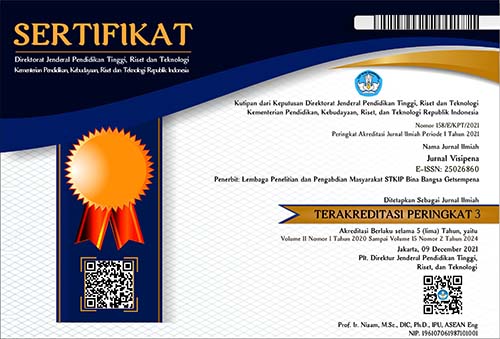THE IMPLEMENTATION OF RECIPROCAL TEACHING IN TEACHING READING COMPREHENSION (AN EXPERIMENTAL RESEARCH AT SMPN 4 BANDA ACEH)
Abstract
This study is about the implementation of reciprocal teaching in teaching reading comprehension. The objectives of the study are:1) to find out if students who are taught through reciprocal teaching have a difference significant than those who are taught through grammar translation method, 2) to find out what the students’ responses toward the implementation of reciprocal teaching in teaching reading comprehension. The method in this study is quantitative and qualitative method. The population is all the second grade students in SMPN 4 Banda Aceh, and the sample is the VIII/I and the VIII/II. The sample was chosen by using random sampling. To obtain the data related to the implementation of reciprocal teaching the writer gave the pre-test and post-test to two groups; experimental group and control group. The instrument used to collect the data was test and questionnaires. The test is used to see the result of achievement of students in reading comprehension while the questionnaires are used to get the students’ responses toward the implementation of reciprocal teaching. The quantitative data was analyzed by means of the statistical procedure in order to see whether there is a difference significant between reciprocal teaching method and grammar translation method in teaching reading comprehension. The questionnaires were analyzed by using the percentage formula for each question item. After processing the data, it found that there is a significant difference between reciprocal teaching and grammar translation method and the students’ response are positive. It can be concluded that reciprocal teaching is better than grammar translation method in teaching reading comprehension. This is proved by the test result where t-test score is higher than t-table (2.45 >1.70) and the students’ ability in the experimental group increases up to 21% while in the control group the students’ ability reaches only 9%. This means that the alternative hypothesis is accepted and the null hypothesis is rejected.
Downloads
References
Rivers, W.M. 1999. Teaching Foreign Language Skills. USA : The University of Chicago Press
Nuttall, C. 1999. Teaching Reading Skills in a Foreign Language: Practical Language Teaching. Oxford:Heinenmann International
Budi Suryanto (2009) Implementing Reciprocal Teaching Method to Improve the Reading Comprehension
Ability of the Eleventh Graders of MAN Muara Teweh – Central Kalimantan. (Abstract). Retrieve from http//abstract reciporcalteaching.htm
Grellet, F. 2000. Developing Reading Skills: A Practical Guide to Reading Comprehension Exercises. Cambridge: Cambridge University Press.
Searfose and Readence. 1998. Developing Expertise in Reading Comprehension Portsmouth, NH: Heinemann.
Clark Leanne. 2003. Reciprocal Teaching Strategy and Adult High School Students. Experimental Study [abstract] M.A Research Project Kean University. Retrieve from abstract online,
Anderson N (2003) Reading in D. Nunan (Ed) Practical English language Teaching New York:McGraw hill Comtemporary.
Harris, P. L. 2000. Children's Detection and Awareness of Textual Anomaly. Journal of Experimental Child Psychology, 31, 212-2330,
Smith and Johnson. 2000. Reading Essentials: The Specifics You Need to Teach Reading Well. Portsmouth, NH: Heinemann.
Hasan, M. Iqbal. 2002. Pokok-Pokok Materi Statistik I (statistic Deskriptif). Jakarta:PT Bumi Aksara.
Sudijono, Anas, 2009. Evaluas Pendidikani Jakarta: Penerbit Rajawali




















